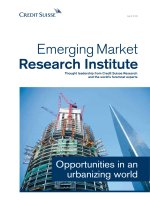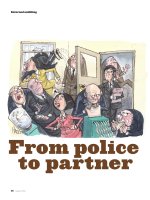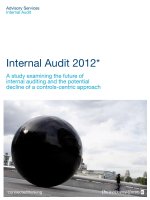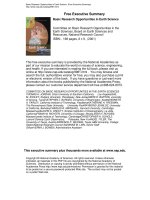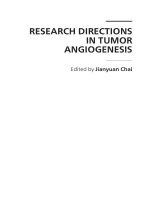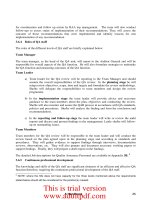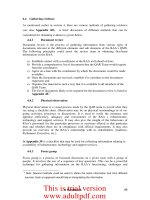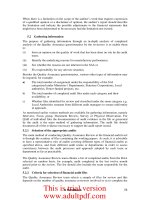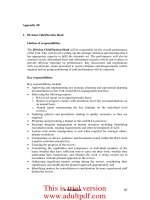Research opportunities in internal auditing edited andrew d bailey
Bạn đang xem bản rút gọn của tài liệu. Xem và tải ngay bản đầy đủ của tài liệu tại đây (2.41 MB, 0 trang )
RESEARCH OPPORTUNITIES
IN INTERNAL AUDITING
Edited by Andrew D. Bailey, Jr., Ph.D., CIA, CPA, CMA, CFE,
Audrey A. Gramling, Ph.D., CIA, CPA,
and
Sridhar Ramamoorti, Ph.D., CIA, ACA, CPA, CFE, CFSA, CRP
The Institute of Internal Auditors Research Foundation
Disclosure
Copyright © 2003 by The Institute of Internal Auditors, 247 Maitland Avenue, Altamonte Springs, Florida
32701-4201. All rights reserved. Printed in the United States of America. No part of this publication may be
reproduced, stored in a retrieval system, or transmitted in any form by any means — electronic, mechanical,
photocopying, recording, or otherwise — without prior written permission of the publisher.
The IIA publishes this document for informational and educational purposes. This document is intended
to provide information, but is not a substitute for legal or accounting advice. The IIA does not provide such
advice and makes no warranty as to any legal or accounting results through its publication of this document.
When legal or accounting issues arise, professional assistance should be sought and retained.
The Professional Practices Framework for Internal Auditing (PPF) was designed by The IIA Board of Directors’
Guidance Task Force to appropriately organize the full range of existing and developing practice guidance
for the profession. Based on the definition of internal auditing, the PPF comprises Ethics and Standards,
Practice Advisories, and Development and Practice Aids, and paves the way to world-class internal auditing.
This guidance fits into the Framework under the heading Development and Practice Aids.
ISBN 0-89413-498-1
02404 01/03
First Printing
Disclosure
Copyright © 2003 by The Institute of Internal Auditors, 247 Maitland Avenue, Altamonte Springs, Florida
32701-4201. All rights reserved. Printed in the United States of America. No part of this publication may be
reproduced, stored in a retrieval system, or transmitted in any form by any means — electronic, mechanical,
photocopying, recording, or otherwise — without prior written permission of the publisher.
The IIA publishes this document for informational and educational purposes. This document is intended
to provide information, but is not a substitute for legal or accounting advice. The IIA does not provide such
advice and makes no warranty as to any legal or accounting results through its publication of this document.
When legal or accounting issues arise, professional assistance should be sought and retained.
The Professional Practices Framework for Internal Auditing (PPF) was designed by The IIA Board of Directors’
Guidance Task Force to appropriately organize the full range of existing and developing practice guidance
for the profession. Based on the definition of internal auditing, the PPF comprises Ethics and Standards,
Practice Advisories, and Development and Practice Aids, and paves the way to world-class internal auditing.
This guidance fits into the Framework under the heading Development and Practice Aids.
ISBN 0-89413-498-1
02404 01/03
First Printing
__________________________________________________________ Editorial Preface ix
EDITORIAL PREFACE
Andrew D. Bailey, Jr.
Audrey A. Gramling
Sridhar Ramamoorti
“The task of the university is the creation of the future, so far as rational thought,
and civilized modes of appreciation, can affect the issue.”
— Alfred North Whitehead (1861-1947)
British Philosopher and Mathematician
Background
Recent scandals in corporate America beginning in late 2001 and the precipitously dropping
stock markets of 2002 prompted Congress to unleash the most sweeping regulatory and
corporate reform legislation in the United States since the Securities Acts of 1933 and 1934.
During this time of a severe crisis of confidence in America’s corporate management,
organizational governance structures and related processes have come under scrutiny. Financial
reporting and corporate governance, usually considered arcane and esoteric issues, have
captured the attention of the press, the public at large, and Congress.
In the past, crises of this nature did not focus on the role of internal auditing. Today, many
are looking to the internal audit function and the chief audit executive as part of the solution
to a perceived breakdown in the systems of business reporting, internal control, and ethical
behavior. The problem has become so severe that even the general public is beginning to
understand the critical role that the internal auditing profession can play. Corporate
management needs to change, but it also needs to be able to demonstrate the credibility of its
leadership. Specifically, within organizations, those charged with governance need to provide
assurances that they have implemented effective governance processes and that all
information reported to the public is itself credible. The internal auditing profession’s role in
this process can be a significant one.
The New York Stock Exchange recently announced that all NYSE-listed companies must
establish an internal audit function — a powerful endorsement and recognition of the critical
significance of internal audit activities. The Institute of Internal Auditors welcomes this
important acknowledgment of the internal auditor’s role in promoting and supporting effective
organizational governance and credible business reporting.
The Institute of Internal Auditors Research Foundation
x Research Opportunities in Internal Auditing
_________________________________
The Board of Trustees of The Institute of Internal Auditors Research Foundation firmly
believes that the academic community has made and can make further significant contributions
to the advancement of the internal audit profession globally.1 This monograph, “Research
Opportunities in Internal Auditing” (ROIA), represents the first step in the Board of Trustees’
commitment to thought leaders in the academic community. The Board of Trustees hopes
that this monograph will foster research on important issues of interest to the public and the
internal auditing community and intends to fund future research based on projects inspired
by this monograph. As ROIA coeditors, we believe that both basic and applied academic
research can provide insight and useful tools that will influence the thinking of other
academics, practitioners, including business leaders, standard-setters and policy makers,
regulators, students, and the general public. Indeed, effective communication of research
findings based on sound academic research can fundamentally shape the future of internal
auditing. We are gratified to note The IIA Research Foundation Board of Trustees’ sincere
interest and commitment to this strategic, long-term endeavor.
We have sought out well-known and respected academics as contributors to this research
monograph. We did not provide these authors with an agenda other than that they reflect on
the potential research contributions that might be made toward a deeper understanding of
the internal auditor’s function. We believe that advances in knowledge, and whatever the
specific outcomes of the ROIA monograph-inspired research programs, will prepare future
generations of internal auditing professionals to better deal with the challenges of a dynamic
and complex global business landscape. Addressing these significant and timely questions
scientifically calls upon the university to serve in its traditional role of promoting socially
productive research and is the first step toward incorporating new ideas in the curriculum. It
is in this sense that we understand philosopher Alfred North Whitehead’s remarks to ring
true — for research insights and teaching innovations at universities carry the potential to
“create the future” or define/change the trajectory of entire professions, including the
profession of internal auditing.
Genesis of ROIA Research Monograph
Over two years ago, members of The IIA’s international Academic Relations Committee put
together a proposal to actively engage U.S. accounting academics in carrying out basic
research on internal auditing. This proposal was endorsed by then Academic Relations Chair
Mary Blake and strongly supported by Larry Rittenberg, then Vice-Chairman of Professional
1
Co-editors Andrew Bailey and Sridhar Ramamoorti are members of The IIA Research Foundation Board of Trustees,
and chapter author, Larry Rittenberg, is President of The IIA Research Foundation Board of Trustees.
The Institute of Internal Auditors Research Foundation
__________________________________________________________ Editorial Preface xi
Practices of The IIA, and by Basil Pflumm, Executive Director of The IIA Research
Foundation. Soon thereafter, a revised proposal was approved by The IIA Research Foundation
Board of Trustees then headed by LeRoy Bookal (now IIA Chairman of the Board). Following
the Board of Trustees’ approval, and a summer 2001 planning session in Chicago, this
research monograph became the initial focus of the project. Shortly after this meeting, contacts
were initiated with a select group of auditing academics, based on their prominence as
respected academic researchers, their various areas of specialization, and existing or potential
interest in internal auditing. Each of these individuals was asked to participate as an ROIA
author and we were overwhelmed by their enthusiastic response.
The coeditors and chapter authors met during the August 2001 annual meeting of the American
Accounting Association (AAA) in Atlanta, Georgia. During this session, and in the following
months, the ROIA monograph began to take shape. Preliminary drafts of ROIA chapters
were discussed at a May 22-23, 2002, conference in Chicago, featuring both academic and
practitioner participants (see list of attendees immediately following this preface). The
conference proved most helpful in crystallizing the ROIA monograph structure, topical
content, in coordinating author efforts, and in surfacing academic and practitioner
perspectives. Much progress had been made in securing finalized draft chapters from all the
ROIA authors by August 2002. By early October 2002, we were ready to submit the final
drafts to The IIA’s publishing and editorial staff.
Purpose, Scope, and Organization of ROIA Research Monograph
The ROIA monograph is first and foremost intended to serve as an inspiration for sound
academic research on topics of interest and importance to internal auditing. Second, it has
been written to act as a “communication bridge” between academics and practitioners. The
already mentioned Chicago ROIA conference was of particular value in assuring that this
communication bridge goal would be successful by initiating a fruitful dialogue between
academics and practitioners. The coeditors of the ROIA monograph, the chapter authors, as
well as the academic and practitioner participants of the Chicago ROIA conference in May
2002 are all committed to sharing their respective perspectives in the true spirit of The IIA’s
motto, “Progress through Sharing.” However, in blending theory and practice, we are doing
more than combining perspectives, methodologies, or techniques. We are bringing together
two different communities — two distinct cultures. We are fully cognizant of the challenges
in blending theory and practice; however, we remain convinced that it is only through such
a merging of perspectives, sometimes called “creative abrasion,” that the most conceptually
sound and robust practical solutions can be developed.
The Institute of Internal Auditors Research Foundation
xii Research Opportunities in Internal Auditing
_________________________________
We also believe that the key to continued development of basic, applied, and pedagogical
research in internal auditing is to take advantage of our knowledge of accounting institutions
and decision settings to provide a basis for the selection of important research topics. The
ROIA monograph is designed to make academic researchers more familiar with the rich
context of internal audit practice while presenting conceptual frameworks that will promote
better understanding of related concepts and theories. In this respect, the research questions
appended to each chapter can be extremely helpful in choosing one or more lines of research
worthy of exploration and investigation. Clearly, readers may develop additional questions
based on the substance of the ROIA monograph and we do hope this will be the case. Also,
the reader will note that the ROIA chapter authors do not suggest how specific issues might
be addressed. We concluded that research method selection is a judgment best left to the
academic researchers themselves as this aspect plays to their comparative advantage and
strength.
Although the academic community is the primary audience for the ROIA monograph, we
believe that others too would benefit by reading its contents. For instance, practicing internal
auditors reading the monograph will gain a better understanding of the role of research in
helping to shape theory. Perhaps more importantly, practitioners will gain an insight into
how theory influences The IIA’s Professional Practices Framework, the role of professional
judgment in internal auditing, the development and feasible uses of new tools and techniques,
and the education of future internal auditors. They will come away with a better grasp of
how all of these influences collectively drive state-of-the-art and contemporary internal
auditing practice. In addition, as has been emphasized before, the ROIA research monograph
highlights the value of academic-practitioner collaborative efforts in pursuing solutions to
challenging practical problems. Finally, we believe that the monograph will provide both
undergraduate and graduate auditing students, as well as interested, non-auditor practitioners,
with a fuller understanding of the interplay between research and practice that is necessary
to keep the internal auditing profession intellectually vibrant, relevant, and visionary.
The chapters are organized in what the coeditors felt was a logical sequence. The reader
may have chosen a different order. We do not consider this an important issue. The Table of
Contents reflects our thinking and provides a reasonably extensive listing of each chapter’s
contents as an aid to readers in locating topics of particular interest to them. The Tables of
Research Questions at the end of each chapter may also be of substantial help in both
identifying issues and locating the chapter content of particular interest to the reader.
The Institute of Internal Auditors Research Foundation
__________________________________________________________ Editorial Preface xiii
Concluding Remarks
The coeditors of this monograph believe that academics, practitioners, and students can
benefit by reading the monograph. Our preface tries to communicate the potential benefits
for both academics and practitioners. We now place this effort before the academic community
in the hope that they will gain from the insights of the chapter authors, but even more
important, that they will bring new and previously unconsidered insights of their own to the
process. We leave it to these researchers to develop projects that are integrative not only of
issues, but also of disciplinary approaches to the complex problems of internal auditing. We
have considerable faith in and rely on the research efforts of our colleagues to make this
monograph a success.
In closing, we wish to express our indebtedness to Larry Rittenberg, President of The IIA
Research Foundation, for his leadership and significant contributions to the ROIA effort
(including as a chapter author). We would also like to thank all the chapter authors and
discussants for their many hours of quality work and their unswerving commitment to tight
deadlines that has made this monograph possible within a reasonable time frame. Finally,
we must mention IIA staff members, Basil Pflumm, Susan Lione, Senior Manager of Research,
and Nicki Creatore, Research Administrator, for their valuable advice and assistance on
behalf of The IIA, as well as IIA Publications Editor Lee Ann Campbell for her help with the
publication content and logistics.
Andrew D. Bailey, Jr., Champaign, Illinois
Audrey A. Gramling, Atlanta, Georgia
Sridhar Ramamoorti, Chicago, Illinois
October 2002
The Institute of Internal Auditors Research Foundation
________________________________________________________ List of Participants xv
LIST OF PARTICIPANTS
CHICAGO ROIA CONFERENCE
MAY 22-23, 2002
Professor A. Rashad Abdel-khalik, University of Illinois at Urbana-Champaign
Mr. Bruce Adamec, President, Creative Assurance
Professor Urton L. Anderson, University of Texas-Austin
Professor Andrew D. Bailey, Jr., University of Illinois at Urbana-Champaign
Mr. Larry Brown, Options Clearing Corporation
Mr. Andy Dahle, PricewaterhouseCoopers LLP
Professor Audrey A. Gramling, Georgia State University
Mr. Eric Hespenheide, Deloitte & Touche LLP
Ms. Evelyn Howell, Sara Lee Corporation
Professor William R. Kinney, University of Texas-Austin
Mr. Michael P. Krzus, Grant Thornton LLP
Professor Morley Lemon, University of Waterloo
Ms. Betty McPhilimy, Northwestern University
Professor Jane F. Mutchler, Georgia State University
Professor Douglas F. Prawitt, Brigham Young University
Dr. Sridhar Ramamoorti, Ernst & Young LLP
Professor Larry E. Rittenberg, University of Wisconsin-Madison
Emeritus Professor Curtis C. Verschoor, DePaul University
Professor O. Ray Whittington, DePaul University
The Institute of Internal Auditors Research Foundation
__________________________________ Biographies of Editors and Chapter Authors xix
BIOGRAPHIES OF EDITORS
AND CHAPTER AUTHORS
Urton Anderson, CIA, CCSA, CGAP, is Clark W. Thompson, Jr., Professor in Accounting
at The University of Texas at Austin and the Associate Dean for Undergraduate Programs.
He joined the Department of Accounting at the University of Texas at Austin in 1984, teaching
auditing and managerial accounting. Urton received his Ph.D. from The University of
Minnesota in 1985. Urton’s research has addressed various issues in internal and external
auditing. He has written two books, Quality Assurance for Internal Auditing and
Implementing the Professional Practices Framework (with Christy Chapman), as well as
papers published in a variety of scholarly and professional journals. He is a Certified Internal
Auditor and from 1994 to 1999 served on the Board of Regents for The Institute of Internal
Auditors. In 1999 he was appointed a member of the Internal Auditing Standards Board and
is currently its chair. He served on the CCSA Steering Committee, which developed the
professional examination for Control Self-Assessment and the CGAP Steering Committee
for the new professional examination in governmental auditing. In 1997 he was awarded the
Leon R. Radde Educator of the Year Award by The Institute of Internal Auditors.
Andrew D. Bailey, Jr., Ph.D., CIA, CPA, CMA, CFE, Professor Emeritus, Accounting,
University of Illinois, August 2002. Prior to retirement, Professor Bailey was the Ernst &
Young Distinguished Professor of Accounting. He was previously Director of the Center for
International Education and Research in Accounting (CIERA) and Editor of The International
Journal of Accounting (TIJA). He was head of the Department of Accountancy, University
of Illinois, from autumn 1994 to summer 1997. He earned two degrees at the University of
Minnesota, B.S.B. and M.S. in accounting, before earning his Ph.D. in accounting at The
Ohio State University in 1971.
Earlier, he was the Deloitte & Touche Professor of Accounting and Head of the Department
of Accounting at The University of Arizona. He has also been a faculty member at the
Universities of Maine, Minnesota (Department Chair), Iowa, Purdue, and The Ohio State
University (Arthur Young Professor of Accounting). He has been a Visiting Professor at the
University of Queensland in Australia, The Otago University in New Zealand, The Norwegian
Graduate School of Management in Oslo, Norway, and Groupe Ècole Superieure de
Commerce de Paris (ESCP) in Paris, France. Formerly with Touche Ross & Co., he is a past
President of the American Accounting Association and past chairman of the auditing section
of the AAA. He has served as coeditor of Auditing: A Journal of Practice & Theory, Associate
Editor of The Accounting Review and has served on numerous academic journal review
The Institute of Internal Auditors Research Foundation
xx Research Opportunities in Internal Auditing
_________________________________
boards. He was the national Beta Alpha Psi Accountant of the Year (Educator), 1996. His
research interests include a range of auditing and professional issues, including auditing in
a computerized environment. He currently serves on the Board of Trustees for The Institute
of Internal Auditors Research Foundation, the AICPA CPA Examination Content Committee,
and several committees of the American Accounting Association. A full vita can be found at
www.cba.uiuc.edu/accountancy/faculty/vitaes/bailey1.pdf
Audrey A. Gramling, Ph.D., CIA, CPA, is an assistant professor in the School of
Accountancy in the Robinson College of Business at Georgia State University. Prior to
joining the faculty at Georgia State University, she was an assistant professor and
PricewaterhouseCoopers Faculty Fellow in the Calloway School of Business and Accountancy
at Wake Forest University (1998 – 2000) and a faculty member in the Department of
Accountancy at the University of Illinois in Urbana-Champaign (1995 – 1998). She received
her Ph.D. from the University of Arizona in 1995 and also holds degrees from the University
of Toledo and Georgia State University. Before obtaining her Ph.D., Audrey worked as an
auditor at Deloitte & Touche (then Deloitte, Haskins & Sells) in Atlanta, Georgia, and as an
internal auditor at Georgia Institute of Technology.
Audrey teaches courses in auditing and assurance services and financial accounting. Her
research investigates both internal and external auditing issues, with a focus on decision
behavior of auditors, audit firm industry specialization, and other factors affecting the market
for audit and assurance services. Her research results have been published in several academic
and professional journals, including Journal of Accounting Research; Auditing: A Journal
of Practice and Theory; Accounting Horizons; Journal of Accounting, Auditing & Finance;
Journal of Accounting Literature; Internal Auditing; and Issues in Accounting Education.
She has received research grants from The Institute of Internal Auditors and KPMG.
Dana R. Hermanson is Cofounder and Director of Research of the Corporate Governance
Center at Kennesaw State University, where he is a Professor of Accounting. He has authored
or coauthored over 100 publications, including articles in such journals as Contemporary
Accounting Research; Auditing: A Journal of Practice & Theory; Journal of Accounting
and Public Policy; Accounting Horizons; and Behavioral Research in Accounting.
Dana is coauthor of a study performed for the Committee of Sponsoring Organizations of
the Treadway Commission (COSO), Fraudulent Financial Reporting: 1987-1997, An Analysis
of U.S. Public Companies. The results of the study have influenced NYSE and NASDAQ
listing requirements, as well as SEC disclosure rules, for smaller public companies. His
research, letters, or quotes have appeared in such outlets as Newsweek; The Wall Street
Journal; Business Week; USA Today; Investor’s Business Daily; The Washington Post; Dow
The Institute of Internal Auditors Research Foundation
__________________________________ Biographies of Editors and Chapter Authors xxi
Jones Newswire; Barron’s; Bloomberg; Fortune; Associated Press; and Reuters. Dana was a
member of the National Association of Corporate Directors’ Blue Ribbon Commission on
Audit Committees. He has received several awards for his contributions in research, teaching,
and professional service, including the 1999 Kennesaw State University Distinguished Scholar
Award and the 2000 Kennesaw State University Distinguished Service Award.
William R. Kinney, Jr., Ph.D., (BS/MS Oklahoma State, 1963/1966; Ph.D. Michigan State,
1968) has taught accounting and auditing at Oklahoma State, Iowa, Michigan, INSEAD,
and Texas. Presently the Charles and Elizabeth Prothro Regents Chair in Business and
PricewaterhouseCoopers Auditing Fellow at the University of Texas at Austin, he is author
of more than 80 scholarly articles. He has received the AAA’s Wildman Award (twice),
Notable Contribution to the Accounting Literature Award, and Outstanding Educator Award,
as well as the AICPA’s Distinguished Contribution to Accounting Education Award. Kinney
served as Editor of The Accounting Review, and has been a member of the AICPA’s Auditing
Standards Board and the FASB’s Financial Accounting Standards Advisory Council.
W. Morley Lemon, Ph.D., FCA, CPA, obtained his BA from the University of Western
Ontario (1961), his MBA from the University of Toronto (1972), and his Ph.D. from the
University of Texas at Austin (1975). He obtained his CA in 1965 and was elected a Fellow
of the Institute of Chartered Accountants of Ontario in 1985. He received his CPA in Texas
in 1974.
Professor Lemon is the PricewaterhouseCoopers Professor of Auditing. In 1998 he was
awarded a University of Waterloo Distinguished Teacher Award. Professor Lemon has been
active in professional activities, including four years as a member of the CICA’s Assurance
Standards Board. His publications include a coauthored monograph on the audit risk model,
a coauthored monograph on accounting methodologies of large firms, and articles in academic
and professional journals. He has presented papers at academic and professional meetings
and universities in Canada and the United States. He has served on the editorial boards of
several academic journals.
Professor Lemon is coauthor, with Arens, Loebbecke, and Splettstoesser, of Auditing and
Other Assurance Services, Canadian Ninth Edition published by Prentice-Hall Canada in
2000, and coauthored five previous editions. He is coauthor with Harrison Horngren, Bamber,
and Norwood of Accounting, Canadian Fifth Edition (2002), and coauthored four previous
editions.
The Institute of Internal Auditors Research Foundation
xxii Research Opportunities in Internal Auditing _________________________________
Jane Mutchler, Ph.D., is Associate Dean for Masters Programs and the Ernst & Young - J.
W. Holloway Memorial Alumni Professor in the Robinson College of Business at Georgia
State University. Prior to her appointment as associate dean she was Director of the School
of Accountancy in the Robinson College. She received her bachelor’s and master’s degrees
in Accounting at the University of South Florida and her Ph.D. in Accounting and Economics
at the University of Illinois. Her research focuses on failed companies and auditors’ going
concern opinion decisions related to such companies and has been published in Auditing: A
Journal of Practice and Theory; Journal of Accounting Research; The Accounting Review;
and Contemporary Accounting Research. She previously held positions at Ohio State
University, where she was named KPMG, Peat Marwick Faculty Fellow, the University of
Arizona and Penn State University where she was named Coopers & Lybrand Faculty Fellow
and Arthur Andersen Professor of Accounting. She has also held faculty internships at the
World Bank and at the Philadelphia office of Andersen LLP. She has served as President of
the Auditing Section and VP-Education for the American Accounting Association. She is a
member of the Accounting Accreditation Committee of the AACSB and a member of the
Board of Research Advisors for The Institute of Internal Auditors.
Douglas F. Prawitt, Ph.D., CPA, is an associate professor at Brigham Young University. He
received his B.S. and MAcc degrees at BYU and his Ph.D. at the University of Arizona, prior to
which he worked in private industry as an internal auditor. Doug teaches financial statement
auditing and assurance services courses in BYU's graduate accounting program, and accounting
and effective managerial decision-making courses in BYU’s Executive MBA program. Doug’s
research, which focuses on the judgment and decision-making of accounting professionals, has
been published in The Accounting Review; Organizational Behavior and Human Decision
Processes; Pacific Accounting Review; Journal of the American Taxation Association; and
Behavioral Research in Accounting.
Doug currently serves on the editorial board of Auditing: A Journal of Practice & Theory. In
addition to his academic research, he has written several award-winning articles for professional
journals, including Internal Auditor; Journal of Accountancy; and CPA Journal. He has also
coauthored several books and monographs, including the recently published Independence &
Objectivity: A Framework for Internal Auditors, and eBusiness: Principles and Strategies
for Accountants. Doug was awarded the BYU Marriott School’s “Outstanding Research” award
in 1998, the Marriott School’s “Teaching Excellence” award in 2000, and the BYU Management
Society’s Merrill J. Bateman Student Choice Teaching Award in 2002. He is currently the Warnick/
Deloitte & Touche Research Fellow at BYU. Finally, Doug has served on several professional
committees and task forces, including The IIA’s Independence & Objectivity and Advanced
Technology Committees and was recently a member of a research team selected and funded by
The Institute of Internal Auditors Research Foundation
__________________________________ Biographies of Editors and Chapter Authors xxiii
the American Institute of CPAs to study the effectiveness of SAS No. 82, Consideration of
Fraud in a Financial Statement Audit. He currently represents the American Accounting
Association on COSO’s Enterprise Risk Management Advisory Council.
Sridhar Ramamoorti, Ph.D., CIA, ACA, CPA, CFE, CFSA, CRP, is the Assistant Director
of Thought Leadership in the Global Investigations & Dispute Advisory (GIDA) practice of
Ernst & Young LLP. His thought leadership responsibilities encompass GIDA practice
development, academic partnering, including professional research and publications, and
technical practice support roles. Prior to joining Ernst & Young, Sri was a Principal with
Arthur Andersen’s firmwide Professional Standards Group. His blended academicprofessional work experience also includes teaching and research, first as a graduate student
at The Ohio State University, and subsequently, as a member of the University of Illinois’
Accountancy faculty.
Earlier in his career, Sri worked as an auditor in the Middle East offices of Ernst & Whinney
(a predecessor firm of Ernst & Young). Sri earned a Bachelor of Commerce (BCom.) degree
from Bombay University, India, and the Master’s in Accounting (MAcc.) and Ph.D.
(Quantitative Psychology) degrees from The Ohio State University, Columbus, Ohio. He
also holds numerous professional certifications. He has published extensively, and serves
on the editorial review boards of several academic and professional journals.
An active volunteer in professional associations, Sri is presently the Chairman of The IIA’s
international Academic Relations Committee, a member of The IIA Research Foundation’s
Board of Trustees, and recently joined the Board of Governors of the Chicago IIA Chapter.
He also serves as the India-Liaison Officer on behalf of the Association of Certified Fraud
Examiners, Austin, Texas. He is the recipient of the 2004 Association of Government
Accountants’ (AGA) National President’s Award for his editorial services as Vice-Chairman
of the editorial board of the Journal of Government Financial Management.
Larry E. Rittenberg, Ph.D., CPA, CIA, is Ernst & Young Professor of Accounting &
Information Systems at the University of Wisconsin. He is currently the Vice President of
Research and President of The Institute of Internal Auditors Research Foundation. His
responsibilities include coordinating and funding research on the practice of internal auditing
on a global basis.
Professor Rittenberg teaches and researches mainly in the areas of auditing and corporate
governance. He is the coauthor (along with Brad Schwieger) of Auditing: Concepts for a
Changing Environment (2001) and the coauthor of The Outsourcing Dilemma: What Works
The Institute of Internal Auditors Research Foundation
xxiv Research Opportunities in Internal Auditing _________________________________
Best for Internal Auditing, recently published by The Institute of Internal Auditors Research
Foundation. He was a member of the Drafting Subcommittee and a committee member of
the Report of the NACD Blue Ribbon Commission on Audit Committees. Professor Rittenberg
is one of the five board members of COSO, the Committee of Sponsoring Organizations of
the Treadway Commission. He is the 1998 recipient of the Leon Radde Award as the
“Outstanding Educator of the Year” by The Institute of Internal Auditors. He has been a
recipient of the “Outstanding Contributor Award” from The Internal Auditor, and has been
recognized by the Wisconsin Institute of Certified Public Accountants as their “Outstanding
Educator.”
T. Flemming Ruud, Ph.D., CPA, is Professor of Internal and External Auditing at the
University of St. Gallen since 1995, and since January 2002, professor of auditing at the
University of Zurich (both 50%). He acts as the Managing Director of the Institute of
Accounting, Controlling and Auditing, University St. Gallen (ACA-HSG) since 2000.
Following studies at the City College in Oslo, Norway, he graduated in 1981 from the graduate
program of Professional Accountancy at the Norwegian School of Economics and Business
Administration (NHH) in Bergen, Norway. He passed the Norwegian State Authorized Public
Accountant (CPA) exam in 1981. Following auditing practice and working as a technical
manager at the Norwegian Institute of Public Accountants, he studied at the University of
Utah, Salt Lake City, receiving the Ph.D. in 1988.
Flemming Ruud was Associate Professor with special responsibilities for the Graduate
Auditing Program at the Norwegian School of Economics and Administration (1988 to 1994)
and thereafter appointed Professor in Auditing at the Norwegian School of Management in
Oslo, Norway, where he now is Adjunct Visiting Professor. His research areas encompass
internal and external auditing, issues in financial aspects of corporate governance, internal
control, and risk management in which he publishes extensively. Flemming Ruud is a member
of several steering committees in academic and business ventures and a member of the
board of the Swiss Institute of Internal Auditing (SIIA). He functions as an advisor to European
academic institutions, auditing firms, governments, professional institutes, and large
corporations, promoting the development of corporate governance, financial and operational
auditing, risk management and control. He is the 2002 recipient of The Institute of Internal
Auditors’ Leon Radde Educator of the Year Award.
The Institute of Internal Auditors Research Foundation
__________________________________ Biographies of Editors and Chapter Authors xxv
Kay W. Tatum, Ph.D., CPA, is an associate professor of accounting at the University of
Miami in Coral Gables, Florida. She joined the University of Miami’s accounting department
in 1986 after earning her Ph.D. at Texas Tech University. In 2002 she received the University
of Miami’s Excellence in Teaching Award, a university-wide award presented to six
professors. She is a member of the AAA’s Auditing Standards Committee, having served as
chairperson of the committee from 2000-2002. She was a member of the AICPA’s Task
Force that developed SAS No. 84, Communications between Predecessor and Successor
Auditors. She was a member of the Joint Working Group, a committee of practitioners,
standard setters, and academics from the U.S., Canada, and the U.K. that studied how the
large accounting firms are applying the audit risk model.
Kay is a coauthor of Developments in the Audit Methodologies of Large Accounting Firms,
a monograph written by the academic members of the Joint Working Group. Kay is a
member of the AICPA’s International Auditing Standards Subcommittee. Her analysis of the
differences between the U.S. and international auditing standards, “Analysis of International
Standards on Auditing,” is published in Appendix B of the AICPA Professional Standards.
She is a contributing author to the book Audit Committees: A Guide for Directors, Management,
and Consultants, which is published by Aspen Law & Business.
Marcia L. Weidenmier, Ph.D., CPA, is an assistant professor in the School of Accountancy
in the College of Business and Industry at Mississippi State University. Prior to joining the
faculty at Mississippi State University, she was an assistant professor of accounting at Texas
Christian University (2001 - 2004). She received her B.B.A. in accounting at the College of
William and Mary and her M.B.A. in information systems as well as her Ph.D. in accounting
at the University of Texas at Austin. Before obtaining her Ph.D., Marcia worked as an
information systems consultant at PricewaterhouseCoopers (then Price Waterhouse) in
Chicago, IL.
Marcia teaches courses in accounting information systems. Her research investigates the
impact of information technology on internal and external auditing, business processes, and
internal controls. In addition to publishing in academic and professional journals, Marcia
also explores how her research results can be applied in the classroom. In 2003 she was
awarded the Outstanding Education Paper by the Information Systems Section of the AAA.
The Institute of Internal Auditors Research Foundation
Disclosure
Copyright © 2003 by The Institute of Internal Auditors, 247 Maitland Avenue, Altamonte Springs, Florida
32701-4201. All rights reserved. Printed in the United States of America. No part of this publication may be
reproduced, stored in a retrieval system, or transmitted in any form by any means — electronic, mechanical,
photocopying, recording, or otherwise — without prior written permission of the publisher.
The IIA publishes this document for informational and educational purposes. This document is intended
to provide information, but is not a substitute for legal or accounting advice. The IIA does not provide such
advice and makes no warranty as to any legal or accounting results through its publication of this document.
When legal or accounting issues arise, professional assistance should be sought and retained.
The Professional Practices Framework for Internal Auditing (PPF) was designed by The IIA Board of Directors’
Guidance Task Force to appropriately organize the full range of existing and developing practice guidance
for the profession. Based on the definition of internal auditing, the PPF comprises Ethics and Standards,
Practice Advisories, and Development and Practice Aids, and paves the way to world-class internal auditing.
This guidance fits into the Framework under the heading Development and Practice Aids.
ISBN 0-89413-498-1
02404 01/03
First Printing
__________________________________________________________ Research Team xvii
RESEARCH TEAM
CHAPTER 1
INTERNAL AUDITING: HISTORY, EVOLUTION, AND PROSPECTS
Sridhar Ramamoorti, Ernst and Young
CHAPTER 2
INTERNAL AUDIT AND ORGANIZATIONAL GOVERNANCE
Dana R. Hermanson, Kennesaw State University
Larry E. Rittenberg, University of Wisconsin-Madison
CHAPTER 3
THE INTERNAL AUDIT FUNCTION: AN INTEGRAL PART OF
ORGANIZATIONAL GOVERNANCE
T. Flemming Ruud, University of St. Gallen, University of Zurich, Switzerland
CHAPTER 4
ASSURANCE AND CONSULTING SERVICES
Urton Anderson, University of Texas-Austin
CHAPTER 5
AUDITING RISK ASSESSMENT AND RISK MANAGEMENT PROCESSES
William R. Kinney, Jr., University of Texas-Austin
CHAPTER 6
MANAGING THE INTERNAL AUDIT FUNCTION
Douglas F. Prawitt, Brigham Young University
CHAPTER 7
INDEPENDENCE AND OBJECTIVITY: A FRAMEWORK FOR RESEARCH
OPPORTUNITIES IN INTERNAL AUDITING
Jane F. Mutchler, Georgia State University
CHAPTER 8
INTERNAL AUDITING’S SYSTEMATIC, DISCIPLINED PROCESS
W. Morley Lemon, University of Waterloo
Kay W. Tatum, University of South Florida
The Institute of Internal Auditors Research Foundation
xviii Research Opportunities in Internal Auditing _________________________________
CHAPTER 9
THE PERVASIVE IMPACT OF INFORMATION TECHNOLOGY
ON INTERNAL AUDITING
Sridhar Ramamoorti, Ernst and Young
Marcia L. Weidenmier, Mississippi State University
The Institute of Internal Auditors Research Foundation
__________________________________________________________ Research Team xvii
RESEARCH TEAM
CHAPTER 1
INTERNAL AUDITING: HISTORY, EVOLUTION, AND PROSPECTS
Sridhar Ramamoorti, Ernst and Young
CHAPTER 2
INTERNAL AUDIT AND ORGANIZATIONAL GOVERNANCE
Dana R. Hermanson, Kennesaw State University
Larry E. Rittenberg, University of Wisconsin-Madison
CHAPTER 3
THE INTERNAL AUDIT FUNCTION: AN INTEGRAL PART OF
ORGANIZATIONAL GOVERNANCE
T. Flemming Ruud, University of St. Gallen, University of Zurich, Switzerland
CHAPTER 4
ASSURANCE AND CONSULTING SERVICES
Urton Anderson, University of Texas-Austin
CHAPTER 5
AUDITING RISK ASSESSMENT AND RISK MANAGEMENT PROCESSES
William R. Kinney, Jr., University of Texas-Austin
CHAPTER 6
MANAGING THE INTERNAL AUDIT FUNCTION
Douglas F. Prawitt, Brigham Young University
CHAPTER 7
INDEPENDENCE AND OBJECTIVITY: A FRAMEWORK FOR RESEARCH
OPPORTUNITIES IN INTERNAL AUDITING
Jane F. Mutchler, Georgia State University
CHAPTER 8
INTERNAL AUDITING’S SYSTEMATIC, DISCIPLINED PROCESS
W. Morley Lemon, University of Waterloo
Kay W. Tatum, University of South Florida
The Institute of Internal Auditors Research Foundation
xviii Research Opportunities in Internal Auditing _________________________________
CHAPTER 9
THE PERVASIVE IMPACT OF INFORMATION TECHNOLOGY
ON INTERNAL AUDITING
Sridhar Ramamoorti, Ernst and Young
Marcia L. Weidenmier, Mississippi State University
The Institute of Internal Auditors Research Foundation
__________________
Chapter 1: Internal Auditing: History, Evolution, and Prospects 1
CHAPTER 1
INTERNAL AUDITING:
HISTORY, EVOLUTION, AND PROSPECTS
Sridhar Ramamoorti
The Institute of Internal Auditors Research Foundation
Disclosure
Copyright © 2003 by The Institute of Internal Auditors, 247 Maitland Avenue, Altamonte Springs, Florida
32701-4201. All rights reserved. Printed in the United States of America. No part of this publication may be
reproduced, stored in a retrieval system, or transmitted in any form by any means — electronic, mechanical,
photocopying, recording, or otherwise — without prior written permission of the publisher.
The IIA publishes this document for informational and educational purposes. This document is intended
to provide information, but is not a substitute for legal or accounting advice. The IIA does not provide such
advice and makes no warranty as to any legal or accounting results through its publication of this document.
When legal or accounting issues arise, professional assistance should be sought and retained.
The Professional Practices Framework for Internal Auditing (PPF) was designed by The IIA Board of Directors’
Guidance Task Force to appropriately organize the full range of existing and developing practice guidance
for the profession. Based on the definition of internal auditing, the PPF comprises Ethics and Standards,
Practice Advisories, and Development and Practice Aids, and paves the way to world-class internal auditing.
This guidance fits into the Framework under the heading Development and Practice Aids.
ISBN 0-89413-498-1
02404 01/03
First Printing
2 Research Opportunities in Internal Auditing
_________________________________
I. Background
The establishment, growth, and evolution of the contemporary internal auditing profession
is closely intertwined with the history of The Institute of Internal Auditors (IIA), an
organization founded in the United States in 1941. In the recently released edition of 60
Years of Progress Through Sharing, chronicling the history of The IIA, internal auditing
historian Dale L. Flesher notes:
“The IIA’s 60-year history is illustrious and each of the highlights featured in this 10year narration [supplementing the 50-year history of The IIA] have contributed to
the organization that The IIA is today:
•
•
•
The primary international professional association dedicated to the promotion
and development of the practice of internal auditing.
The recognized authority, chief educator, and acknowledged leader in standards,
certification, research, and technological guidance for the profession worldwide.
Global headquarters for 76,400 members in 141 countries.” (Flesher & McIntosh,
2002, ix)
Considering The IIA’s rather humble origins — a small band of 24 charter members
who held the inaugural IIA meeting in New York City1 on December 9, 1941 — this
worldwide expansion, continuing relevance, and increasing influence and recognition
of The IIA and the internal auditing profession over the last 60 years constitutes
remarkable growth and progress. Indeed, the internal auditing profession certainly
appears poised for continued dynamic growth and promises to become “a profession
for the 21st century.”2
II. Internal Auditing: An Historical Perspective
The demand for both external and internal auditing is sourced in the need to have some
means of independent verification to reduce record-keeping errors, asset misappropriation,
and fraud within business and nonbusiness organizations. The roots of auditing, in general,
are intuitively described by accounting historian Richard Brown (1905, quoted in Mautz &
Sharaf, 1961) as follows:
“The origin of auditing goes back to times scarcely less remote than that of
accounting…Whenever the advance of civilization brought about the necessity of
one man being intrusted to some extent with the property of another, the advisability
of some kind of check upon the fidelity of the former would become apparent.”
The Institute of Internal Auditors Research Foundation
__________________
Chapter 1: Internal Auditing: History, Evolution, and Prospects 3
As far back as 4000 B.C., historians believe, formal record-keeping systems were first
instituted by organized businesses and governments in the Near East to allay their concerns
about correctly accounting for receipts and disbursements and collecting taxes. Similar
developments occurred with respect to the Zhao dynasty in China (1122-256 B.C.). The
need for and indications of audits can be traced back to public finance systems in Babylonia,
Greece, the Roman Empire, the City States of Italy, etc., all of which developed a detailed
system of checks and counterchecks. Specifically, these governments were worried about
incompetent officials prone to making bookkeeping errors and inaccuracies as well as corrupt
officials who were motivated to perpetrate fraud whenever the opportunity arose. Even the
Bible (referring to the period between 1800 B.C. and A.D. 95) explains the basic rationale
for instituting controls rather straightforwardly: “…if employees have an opportunity to
steal they may take advantage of it.” The Bible also contains examples of internal controls
such as the dangers of dual custody of assets, the need for competent and honest employees,
restricted access, and segregation of duties (O’Reilly et al., 1998). Historically then, the
emergence of double-entry bookkeeping in circa 1494 A.D. can be directly traced to the
critical need for exercising stewardship and control. Throughout European history, for instance,
fraud cases — such as the South Sea bubble of the 18th century, and the tulip scandal —
provided the justification for exercising more control over managers.
Within a span of a couple of centuries, the European systems of bookkeeping and auditing
were introduced into the United States. As business activities grew in size, scope, and
complexity, a critical need for a separate internal assurance function that would verify the
(accounting) information used for decision-making by management emerged. Management
needed some means of evaluating not only the efficiency of work performed for the business
but also the honesty of its employees. Around the turn of the 20th century, the establishment
of a formal internal audit function to which these responsibilities could be delegated was
seen as the logical answer. In due course, the internal audit function became responsible for
“careful collection and interpretive reporting of selected business facts” to enable management
to keep track of significant business developments, activities, and results from diverse and
voluminous transactions (Mautz, 1964). Companies in the railroad, 3 defense, and retail
industries had long recognized the value of internal audit services, going far beyond financial
statement auditing and devoted to furnishing reliable operating reports containing nonfinancial
data such as “quantities of parts in short supply, adherence to schedules, and quality of the
product” (Whittington & Pany, 1998). Similarly, the U.S. General Accounting Office (GAO)
and numerous State Auditors’ Offices, for instance, the State of Ohio Auditors’ Office, have
traditionally employed large numbers of internal auditors.
In sum, the collective effect of growing transaction complexity and volume, the owner/
manager’s (“principals”) remoteness from the source of transactions and potential bias of
The Institute of Internal Auditors Research Foundation
